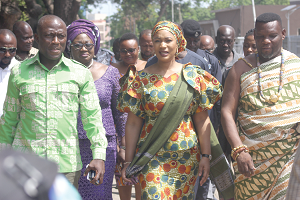Ghana yesterday commemorated the 2019 United Nations (UN) World Environment Day in Accra, with a message to the public that ensuring clean air and a healthy population was a shared responsibility.
This year’s commemoration put priority on curbing air pollution, which the UN describes as a global environmental health hazard which results in more than seven million premature deaths in the world annually.
The day is marked globally every June 5, but Ghana marked the day yesterday, June 6, because it coincided with the Edi-ul-Fitr prayers.
A World Health Organisation (WHO) research has established that in Ghana 28,000 lives are lost prematurely to air pollution annually.
Data available to the Environmental Protection Agency (EPA) indicates that air pollution in Ghana is basically caused by the open burning of waste, poor transportation and management of waste, cooking with solid fuel, vehicular fumes, among others.
The health implications recorded include respiratory diseases, cancer, brain injury in children, among many others, with high mortality rates.
Objective/theme
The commemoration of the day is a global platform instituted by the UN in 1974 to raise awareness of the need to create and sustain a healthy environment and the importance of a healthy environment to the sustainability of human and animal life and health.
It is also a wake-up call to all stakeholders to advocate and imbibe actions and behaviours necessary for protecting the environment.
The 2019 global theme was: “Beat Air Pollution", while the day was marked locally on the theme: “Clean air; our lifeline and shared responsibility”.
Globally, the UN urged governments, industry, communities and individuals to come together to explore renewable energy and green technologies and improve air quality in cities and regions to mark the day.
National forum
At a national stakeholders’ forum to mark the day, the wife of the Vice-President, Mrs Samira Bawumia, reminded all that ensuring clean air and a healthy population was a shared responsibility and so all had to actively contribute to that.
She said air pollution affected all, stressing that no one had a choice with regard to air for breathing, unlike the choice not to drink from polluted water sources.
“Since we all do not have a choice, we must all be concerned about how Ghana can deal with air pollution and its attendant health issues. We also must make conscious efforts not to contribute to air pollution,” she said.
Mrs Bawumia, an ambassador for Cook Clean Alliance, an organisation championing the usage of environmentally friendly and healthy fuel, said 70 per cent of Ghanaians cooked with solid fuel such as charcoal and that the toxins from those solid fuels were affecting the health of particularly women and girls who often did the cooking.
She called for a holistic approach that would strengthen the synergies among stakeholders, policies and all interventions to deal with the root cause of air pollution.
The Deputy Minister of Environment, Science, Technology and Innovation, Ms Patricia Appiah-Agyei, who also addressed the forum, said although the government had put in place a number of interventions to deal with air pollution, there was the need for a national conversation on the phenomenon to accelerate the efforts.
She listed the interventions to include the institution of an e-waste management centre to stop the burning of e-waste, the introduction of a plastic waste policy to regulate the use and disposal of plastic waste and the introduction of vehicle emission testing and standards to curb vehicular air pollution.
Premature deaths
The acting UN Resident Coordinator for Ghana, Ms Sylvia Lopez, said half of the seven million people who died prematurely from air pollution were directly exposed to fumes from cooking fuel.
She said 92 per cent of people worldwide did not breathe clean air and commended Ghana for instituting an infrastructure that would monitor air quality, as well as instituting measures to ensure clean air.
The Chief Executive of the Accra Metropolitan Assembly (AMA), Mr Muhammed Adjei Sowah, for his part, said as part of its contribution to the national effort to enhance air quality, the AMA had initiated a bin distribution programme to discourage the burning of waste in the open.
He said it was also undertaking decongestion exercises, planting trees, enforcing environmental bye-laws, among other interventions, to enhance air quality in the city.
The Chief Executive Officer (CEO) of the Ghana Standards Authority, Professor Alex Dodoo, said Ghana had standards to ensure that air quality was ensured and said the GSA would continue to collaborate with other stakeholders to uphold those standards.
The Deputy CEO of the Driver and Vehicle Licensing Authority, Mr Prince Opoku Adusei, said the authority would soon introduce compulsory vehicle emission testing before a vehicle would be licensed or a roadworthiness certificate renewed.
Writer’s email doreen.andoh@graphic.com.gh

